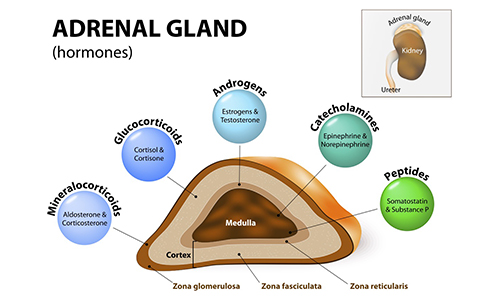Everyone experiences fatigue from time to time, whether due to poor sleep or a busy day. While inconvenient, this fatigue is not life-disrupting and can usually be resolved with a good night’s rest. Chronic Fatigue Syndrome (CFS) is much different. This complex...
What We Treat
Adrenal Dysfunction and Fatigue
Almost every patient I work with has some level of adrenal dysfunction. The adrenal glands are small glands that sit on top of each kidney. They produce hormones and are equipped to handle acute stress. Unlike our ancestors, we usually aren’t acutely fighting for our survival, but we are under much more chronic stress than our body was designed to handle. Let’s face it. We are all under chronic stress. This stress comes from many sources.
First of all, there is the stress of daily living. If you are like me, the to-do list never seems done. When it gets close to being done, more things are added. 24 hours in a day often just doesn’t seem like enough. This type of stress is called emotional stress and it affects everyone to some degree. Add to it bigger emotional stressors such as death, divorce, illness, or conflict, and emotional stress alone can be too much for the adrenal glands to handle and dysfunction ensues.
In addition to emotional stress, there are also less obvious stressors like hidden infections in the gut and the effects of toxins on your body. So even if you aren’t feeling emotional stress this hidden stress can be having a negative effect on your adrenal glands.


We all are equipped to handle a lot of stress for a long time, but we all have our limits too.
There are 3 types of stressors:
- Emotional stress
- Stress from hidden infections in the gut
- Stress from toxins
If these 3 stressors add up to more than our body can handle, our stress bucket overflows and our adrenal glands become dysfunctional. Sometimes it isn’t even our biggest stressor that causes our stress bucket to overflow, just the next thing on top of all the other stressors.
When the adrenals become overwhelmed, shifts in hormone production occur in an attempt to protect you. The adrenals respond as if you are in danger of dying so the focus becomes survival.
Changes occur such as:
- slowing the metabolism
- storing body fat
- lowering the immune system in the gut
- decreasing sex hormone production
- decreasing thyroid hormone production
These changes are exactly what you want your body to do if you are in immediate life-threatening danger. Your body is trying to protect you. These changes, while helpful if you are truly in danger of acutely dying, prevent you from feeling your best over the long term. As the adrenals shift hormone production to keep you alive, the hormonal changes can leave you feeling tired and irritable. You may struggle to lose weight. You may get frequent infections. You get the sense that something just isn’t right. Likely you’ve seen your doctor, but the traditional labs don’t show a problem. You are told you are fine, but you know deep down inside you aren’t.
In my 15 years as a family doctor, I believed patients like you. I knew there was something we were missing. I just didn’t know how to find it or how to treat it. Now, with functional medicine, I do.
So often it is the adrenals. Identifying and fixing this is the key to feeling great again. I test the adrenals in all of my patients. I believe it is foundational for feeling great and establishing a strong base to treat other problems.
Of course, learning new techniques for managing stress is vital to keep the problem from coming back. So we work on that too. We use a combination of lifestyle change and supplements to fix the problem and it works!
If you aren’t feeling your best, there is a reason. Starting with the adrenals is a great place to begin.
Just for You
The Latest on Adrenal Dysfunction
Autoimmune Disease: Genetics vs. Environment
Research shows that autoimmune diseases are on the rise, yet there is still a great deal that we don’t know about their immunological basis. While most scientists point to both genetic and environmental factors as potential causes, much uncertainty...
Sweep Away Toxins: A Guide to Healthy Living
With spring in the air, now is the perfect time to refresh your home. However, the last thing we want to do is load our homes and bodies with the toxic chemicals found in so many conventional cleaning products! Keep reading if you are motivated to clean...




